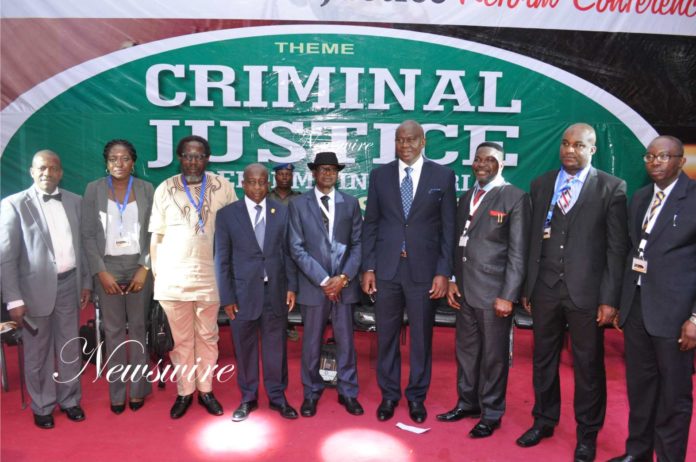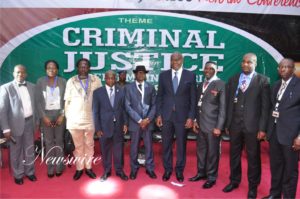
ASABA CONFERENCE ON CRIMINAL JUSTICE REFORM: Different Views as Ozekhome, Others Ponder Use of Special Anti-corruption Courts
Lagos lawyer, Chief Mike Ozekhome, SAN has criticized the federal government’s war on corruption as selective and in bad faith. He was speaking on Thursday as part of a panel during the fourth discussion session at the 5th NBA Criminal Justice Reform Conference in Asaba, the Delta State capital.

NEWSWIRE’s correspondent in Asaba reports that the session, which was chaired by a retired Justice of the Supreme Court, Hon. Justice Suleiman Galadima, was titled ‘Corruption, Economic and Financial Crimes – Special Courts to the Rescue?’ and featured two lead speakers – both of them from the government’s anti-graft agency, the Economic and Financial Crimes Commission (EFCC) who questioned the adequacy of the current and presently-overburdened judicial system to effectively eradicate the scourge of corruption and its corrosive impact on our society, and proposed the establishment of Special Courts with a mandate to try corruption and related cases. While admitting that the concept of special courts was not new in Nigeria (other special courts being the National Industrial Court, Revenue Courts, the defunct Robbery and Firearms Tribunal of the military era, etc) Mr. Gbolahan Latona – who represented the acting chairman of the EFCC, Mr. Ibrahim Magu – reminded the assembled conferees of the huge cost of corruption to Nigerians as individuals and as a society. He quoted a study by PriceWaterhouseCooper which revealed that, if not effectively tackled, the daily cost of corruption to each Nigerian will reach 2000 US dollars by the year 2030 – and bleed the country of almost 40% of its gross domestic product (GDP). While admitting that special anti-courts were ‘no silver bullet’ capable of felling the monster of corruption with one mighty stroke, Latona nevertheless said such courts would, among other benefits, enhance judicial integrity and rule of law; encourage specialization and deepen the expertise of both judges and lawyers in particular areas of prosecution
On the matter of specialization, Mr. Latona therefore called on more lawyers to become ‘anti-corruption activists’, describing the scourge as the deadliest threat to human rights and dignity. He also urged the assembled delegates to consider whether the decisions of Special Anti-Corruption Courts should be deemed to be final, or appealable – and if appealable, to whom.
The second lead speaker, Dr. Fatima Waziri Azi, who represented the executive secretary of the presidential advisory council against corruption (PACAC), Prof. Bolaji Owasanoye, disclosed that the EFCC was still pondering whether such courts should be stand-alone institutions or a hybrid in terms of functions. She described the idea of special anti-corruption courts as a growing trend in countries around the globe – including many parts of Africa. Dr. Azi also called on members of the legal profession to take up the challenge of ‘monitoring’ corruption cases and incidences of corruption in the society.
While the idea of special courts to fight corruption was a noble one in itself, Chief Ozekhome, SAN, disagreed sharply with the federal government’s approach to fighting graft in Nigeria, which he said, was at variance with the constitutionally-enshrined principles of due process, the presumption of innocent until guilt is proved beyond reasonable doubt, and the guarantee of fair trial. He condemned the practice of ‘naming and shaming’ prior or during formal court proceedings, and often before investigations are concluded – a practice which negates the presumption of innocence, and often casts a stigma on the recipient of such a practice long after his/her acquittal in court. While not underestimating the negative impact of corruption (which he described as ‘the 37th state in Nigeria, the most weird and most powerful’) Ozekhome, SAN nevertheless expressed the fear that special courts would be seen by judges designated to them as a special kind of promotion, and a mandate to ‘convict at all cost.’ While agreeing with the truism that ‘justice delayed is justice denied,’ the learned silk also asserted that ‘justice rushed is justice CRUSHED.’
Contributions were also made by another Senior Advocate of Nigeria, Dr. Garba Tetengi, who called for a streamlining of the functions and powers of such special courts.
The only non-lawyer among the panelists, Comrade Debo Adeniran, who is the executive chairman of the Centre For Anti-Corruption and Open Leadership (CACOL), identified a number of what he called ‘types of corruption’ and asserted that certain of these ‘types’ were morally – if not legally – acceptable if they lead to the opening of a Pandora’s box of monumental corruption, and ultimately to the cleansing of society. Such a quasi-Machiavellian approach, he said, would be forgiven by posterity, even if not by the law.
In contrast to Ozekhome’s fiery defence of the role of lawyers, especially SANs, in the fight against corruption, the acting chairman of the Independent Corrupt Practices and Related Offences Commission (ICPC), Dr. Usman Abubakar urged lawyers to look beyond material benefits and think more about the sort of legacy they wished to leave for future generations.
The Hon. Justice C. K. Nwankwo of the Abia State High Court, who rounded off the list of panelists, questioned the Special Court’s emphasis on ‘judicial specialization,’ wondering if such a thing would not produce a breed of parochial judges unable to reintegrate into the larger stream of judicial work once their mandate at the Special Courts came to an end. What ultimate mattered, he added, was what kind of person a judge, lawyer or investigator is deep down, saying such distinctions in personal character made all the difference between ‘high-trust’ and ‘low-trust’ societies.
The session was followed by an equally lively question-and answer session.

Do you need to be heard? Or your articles published? Send your views, messages, articles or press release to: newswiremagazine@yahoo.co.uk >>> We can cover your (LAW) events at the first Call: 08039218044, 08024004726
-Advertisement-
Grab our latest Magazine, "Chief Wole Olanipekun, CFR, SAN, A man of wide horizons and deep intentions". Get your order fast and stress free.
For more details about Newswire Law&Events Magazine, kindly reach out to us on 08039218044, 09070309355. Email: newswiremagazine@yahoo.co.uk. You will be glad you did





